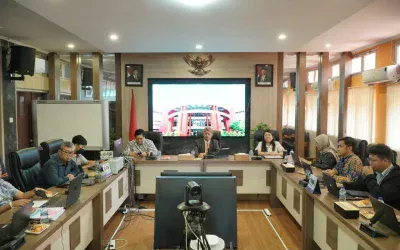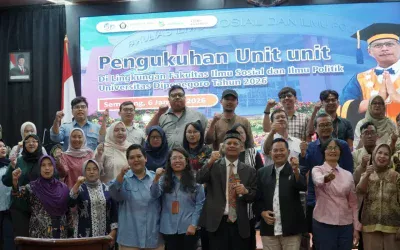Semarang (25/10) – Doctor of Social Science, Faculty of Social and Political Sciences, Universitas Diponegoro has just held a Guest Lecturer with the theme “Concepts and Challenges of the Capital of Nusantara as a Forest City”. The activity was held on Saturday, October 22, 2022, through a Zoom meeting and can be rewatched on the official Youtube channel of FISIP Undip. This Guest Lecturer was attended by Prof. Dr. Ir. Mustofa Agung Sardjono, IPU (Professor of Community Forestry, Faculty of Forestry, Universitas Mulawarman) as the speaker and Prof. Ari Pradhanawati, MS. (A professor at the Department of Business Administration FISIP – UNDIP) as the moderator.
In his presentation, Mustofa explained several things related to the determination of the Capital of Nusantara (IKN), the general condition of the IKN, the concept of IKN as a Forest city, and the challenges. The IKN area would be located in 2 regencies in East Kalimantan, namely Kutai Kartanegara Regency and North Penajam Paser Regency. All areas included in the IKN would no longer be the territory of East Kalimantan. Later the area would become an area under the administration of the Special Region/Capital Authority government.
He also explained that almost all areas at IKN still had the potential for biodiversity. Some of the flora and fauna there were endemic. In addition, the population in the IKN area was currently relatively high, around 165,463 people. This was because its location was close to the Natural Resources industry. Although the location was often used as a destination for people from outside Kalimantan to find work in the natural resources sector, social conflicts were not heard much.
The presence of IKN is expected to bring changes from associative interactions to dissociative ones, especially land and natural resource conflicts. In addition, realizing IKN as a Forest City also brings several challenges including overlapping areas and permits, community land occupations, land tenure on behalf of indigenous peoples, degradation, deforestation and GHG emissions (Greenhouse Gases), land conversion and loss of ecosystem services, threatened biodiversity in IKN areas, and dominance of invasive species in degraded areas. Mostofa at the end of his presentation said that realizing IKN as a forest city was not an easy matter and required hard efforts (intelligence, discipline, patience, and firmness).





0 Comments